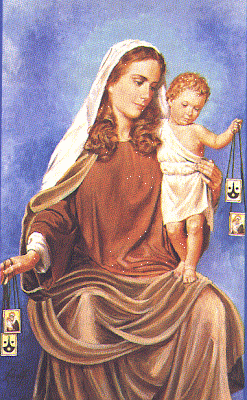
Today, the Church remembers Saint Maria Goretti, the young 12 year old girl who was martyred when she refused to submit to the sexual advances of Alessandro Serenelli. The young man, on whose family's property Maria and her mother lived, had propositioned her for sexual favors on several occasions. She had denied him each time until finally, he set his mind to have his way with or without her cooperation. When she said no to him even after having been threatened at the end of a dagger, Alessandro stabbed her over a dozen times.
Typically, Saint Maria is remembered for purity and chastity. Her most well known patronage is that of rape victims. There is on occasion discussion as to whether or not she presents an ordered image of purity, with some expressing concern that her story would seem to place a burden of impurity on rape victims, who are of course victims rather than moral agents themselves. This is certainly an understandable concern.
On this subject, it is important to note several things. First, when she was attacked, Maria expressed as much concern for Alessandro's purity as for her own, and certainly the act of rape would constitute an offense against
his purity. Second, whether Maria had the right understanding of purity or not - recall that she was in fact only twelve years old at the time and can hardly be blamed for having an imperfect concept of it - there is certainly a great deal we can learn from considering just how greatly she valued purity. Even if she erroneously thought to impute to herself that affront against purity which would be found in a rape, the point is that she understood that her purity was more important than her physical life. This is a tremendous lesson which we must take to heart. Now, could there ever arise a scenario in which one would need to sacrifice his life to preserve his purity? I cannot conceive of one myself. However, the concept itself is true: ultimately, our purity does have more value than our lives, for our earthly lives will cease while our souls - in which is found purity - will subsist forever.
All of this said, I do not think that purity is the real message of Maria Goretti. Rather, it is forgiveness and compassion, and respect for the dignity of
every person that Saint Maria and her story teach us more than anything, and in my opinion the single most important message she can give to those of us who are already dedicated Catholics. While her lessons of purity are sorely needed by most of our current culture, for the dedicated, practicing Catholic purity is a given - a struggle, perhaps, but not something about which we need a great deal of convincing.
Forgiveness and compassion, on the other hand, seem to be sorely lacking amongst even the most sincere of Catholics. To forgive was perhaps Christ's most frequently spoken teaching, and yet it is something we so frequently fail to do. All the worse is this as we have been taught that we would be forgiven based on how we forgive others!
The photograph at the top of this post may seem rather out of place for a post on the subject of a twelve year old girl, but it is in fact at the very core of all that Maria can teach us. It is the photo of an aged Alessandro Serenelli, kneeling in prayer before an image of Maria Goretti, whom years before he had sought to rape and ultimately brutally murdered. After Maria appeared to him in prison, he had a conversion of heart which led him to be one of the most sincere of Christ's followers. He spent the last 33 years of his life in a Franciscan monastery as a lay brother.
There is so much that we can learn from Maria and Alessandro. While dying in the hospital of her wounds, Maria is said to have spent the last 20 hours of her life praying for her attacker and asking the Lord to forgive him. As has already been said, she appeared to him after her death to bring about his conversion. That she would wish to do this was not only a matter of her heavenly perfection, for during those hours in the hospital she also told people that she wanted to have Alessandro in Heaven with her. How many times have we been angry at others - so often for things which are morbidly insignificant compared to rape and murder - and not been able to consider being with them in Heaven? Consider the person the person who has done the most evil to you and caused you the most pain. Indeed, as a follower of Christ, you are called not only to be willing to spend eternity with him or her, but indeed to
desire it and even - yes and even this! - to
work for it. Oh, how terrible this can seem - yet Maria Goretti provides us with a tremendous example to follow.
Even Maria's mother forgave Alessandro - and attended Mass with him. There are no limits to forgiveness. How many of us could grudgingly - or even easily - forgive an offense against us yet could not approach forgiving something done to one we love? Yet we must, and with the grace of God, we can.
I leave you with the testimony of Alessandro Serenelli, written about 9 years before his death and ultimately born from the compassion and forgiveness of that person whom he had hurt the most:
"I'm nearly 80 years old. I'm about to depart.
"Looking back at my past, I can see that in my early youth, I chose a bad path which led me to ruin myself.
"My behavior was influenced by print, mass-media and bad examples which are followed by the majority of young people without even thinking. And I did the same. I was not worried.
"There were a lot of generous and devoted people who surrounded me, but I paid no attention to them because a violent force blinded me and pushed me toward a wrong way of life.
"When I was 20 years-old, I committed a crime of passion. Now, that memory represents something horrible for me. Maria Goretti, now a Saint, was my good Angel, sent to me through Providence to guide and save me. I still have impressed upon my heart her words of rebuke and of pardon. She prayed for me, she interceded for her murderer. Thirty years of prison followed.
"If I had been of age, I would have spent all my life in prison. I accepted to be condemned because it was my own fault.
"Little Maria was really my light, my protectress; with her help, I behaved well during the 27 years of prison and tried to live honestly when I was again accepted among the members of society. The Brothers of St. Francis, Capuchins from Marche, welcomed me with angelic charity into their monastery as a brother, not as a servant. I've been living with their community for 24 years, and now I am serenely waiting to witness the vision of God, to hug my loved ones again, and to be next to my Guardian Angel and her dear mother, Assunta.
"I hope this letter that I wrote can teach others the happy lesson of avoiding evil and of always following the right path, like little children. I feel that religion with its precepts is not something we can live without, but rather it is the real comfort, the real strength in life and the only safe way in every circumstance, even the most painful ones of life."





